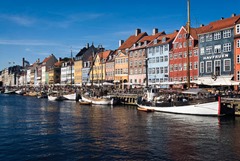Look north for prosperity
 ICTU’s Macdara Doyle questions the value of low corporation tax and suggests the Nordic model as a better alternative.
ICTU’s Macdara Doyle questions the value of low corporation tax and suggests the Nordic model as a better alternative.
Change is afoot and once again our policy-makers appear to be behind the curve rather than in a position to anticipate what is coming down the tracks. Congress and the wider trade union movement has long argued the necessity for Ireland to develop a coherent, pro-active and progressive industrial policy in which the economy is seen as a servant of society and not vice versa.
We argued this long before the current crisis hollowed out the much-vaunted Celtic Tiger and have argued it with it with far greater vehemence and urgency since then. The failure to set about that task as a matter of urgency, since 2008, amounts to no less than a dereliction of duty on the part of officialdom because in the absence of such a strategy, any economy and society is always more vulnerable to unscheduled ‘events’ and shocks.
And in late July, US President Barrack Obama signalled that such an event is clearly in the offing with veiled but discernible public criticism of US corporations ‘gaming the tax code’ by supposedly moving their headquarters overseas.
If the point of that address was lost on Irish policy-makers, then his subsequent reference to Ireland in a follow-up interview should have been enough to make the entire Cabinet sit bolt upright and prick up their ears.
In short, the article of faith that was Irish corporate tax policy – including a tax regime favourable to profit shifting – will soon be a thing of the past, not because of a realisation in Dublin that it was only ever a short-term measure for short-term advantage, but because the US Government is sick of being conned.
In truth, the real problem was less the actual rate of corporate tax, rather the ‘innovations’ introduced here – such as the ‘double Irish’ – which meant that the effective rate paid often bore no relation to the nominal rate.
Once again, we will scramble to react and scramble to keep up with the pace of change, as painting ourselves into economic and social corners is something successive governments have become particularly adept at.
It was always foolish to make slavish corporate tax policy a cornerstone of our industrial policy but no less than deluded to then transform it into an article of faith, the questioning of which was akin to an act of treason or national sabotage.
Strange to reflect how this belief became even more embedded in the national ‘economic discourse’ even as those very crimes were committed by our senior bank executives and home-grown corporations.
Over 50 years ago, the Nordic countries set about designing a new economic model that would play to national strengths and regional variations and help insulate them against future shocks.
The success of that model can be witnessed in the success of their economies internationally, the higher levels of equality that are obtained in their societies and the fact that they have emerged virtually unscathed from this current, global crisis.
We do economics for slow learners here in Ireland, as the social wasteland evident in many of our towns and cities can attest to. Our localised version of the Anglo-Saxon free market model has led us into crisis and left us bereft of solutions.
In his recent remarks on corporate tax avoidance, President Obama very pointedly counterposed their relentless drive for profit maximisation with the necessity for ‘good citizenship’ and wider social responsibility.
In other words, an economy that is detached from wider society is politically, socially and financially unsustainable in the longer term. You’d have thought we had no need to learn that lesson here in Ireland.





